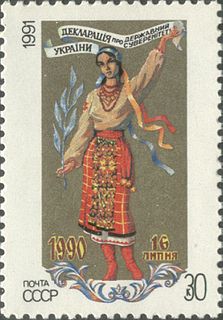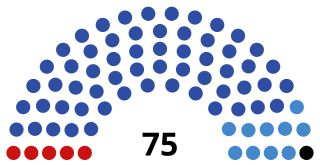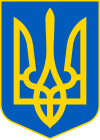The politics of Ukraine take place in a framework of a semi-presidential representative democratic republic and of a multi-party system. A Cabinet of Ministers exercises executive power. Legislative power is vested in the parliament. Taras Kuzio described Ukraine's political system in 2009 as "weak, fractured, highly personal and ideologically vacuous while the judiciary and media fail to hold politicians to account". Kuzio has categorised the Ukrainian state as "over-centralised" - both as a legacy of the Soviet system and caused by a fear of separatism. Corruption in Ukraine is rampant, and widely cited - at home and abroad - as a defining characteristic of Ukrainian society, politics and government.

The Ukrainian Soviet Socialist Republic, also known as Soviet Ukraine, was one of the constituent republics of the Soviet Union from the Union's inception in 1922 until its breakup in 1991. In the anthem of the Ukrainian Soviet Socialist Republic, the republic was referred to simply as Ukraine. The republic was governed by the Communist Party of the Soviet Union through its republican branch, the Communist Party of Ukraine, as a union republic of the Soviet Union, which existed as a highly centralized one-party state.

The Verkhovna Rada of Ukraine, often simply Verkhovna Rada or just Rada, is the unicameral parliament of Ukraine. The Verkhovna Rada is composed of 450 deputies, who are presided over by a chairman (speaker). The Verkhovna Rada meets in the Verkhovna Rada building in Ukraine's capital Kyiv. The deputies elected in the 21 July 2019 Ukrainian parliamentary election were inaugurated on 29 August 2019.
The judicial system of Ukraine is outlined in the 1996 Constitution of Ukraine. Before this there was no notion of judicial review nor any Supreme Court since 1991's Ukrainian independence. when it started being slowly restructured.

The Constitution of Ukraine is the fundamental law of Ukraine. The constitution was adopted and ratified at the 5th session of the Verkhovna Rada (parliament) of Ukraine on June 28, 1996. The constitution was passed with 315 ayes out of 450 votes possible.

The Prosecutor General of Ukraine heads the system of official prosecution in courts known as the Office of the Prosecutor General of Ukraine. In 1991 the post was inherited from the socialist law state. The term of authority of the Prosecutor is six years. She or he is appointed and dismissed by the president with parliamentary consent. Parliament can force the Prosecutor General to resign after a vote of no-confidence.

The transfer of the Crimean Oblast in 1954 was an administrative action of the Presidium of the Supreme Soviet of the Soviet Union, which transferred the government of the Crimean Peninsula from the Russian Soviet Federative Socialist Republic to the Ukrainian SSR.

The states parties to the Rome Statute of the International Criminal Court are those sovereign states that have ratified, or have otherwise become party to, the Rome Statute of the International Criminal Court. The Rome Statute is the treaty that established the International Criminal Court, an international court that has jurisdiction over certain international crimes, including genocide, crimes against humanity, and war crimes that are committed by nationals of states parties or within the territory of states parties. States parties are legally obligated to co-operate with the Court when it requires, such as in arresting and transferring indicted persons or providing access to evidence and witnesses. States parties are entitled to participate and vote in proceedings of the Assembly of States Parties, which is the Court's governing body. Such proceedings include the election of such officials as judges and the Prosecutor, the approval of the Court's budget, and the adoption of amendments to the Rome Statute.

Belarusian citizenship is membership in the political community of the Republic of Belarus. Belarusian citizens also hold citizenship in the Union State of Russia and Belarus.

The Declaration of State Sovereignty of Ukraine was adopted on July 16, 1990 by the recently elected parliament of Ukrainian SSR by a vote of 355 for and four against.

The State Council of Crimea is the parliament of the Republic of Crimea. It had previously been called the 'Supreme Council of Crimea' but changed its name in March 2014 following a vote by the Ukrainian parliament to dissolve the Supreme Council of Crimea. The Parliament is housed in the Parliament building in the centre of Simferopol.

The Declaration "On the Restoration of Independence of the Republic of Latvia" was adopted on 4 May 1990, by the Supreme Soviet of the Latvian SSR. The Declaration stated that, although Latvia had de facto lost its independence in 1940, when it was annexed by the Soviet Union, the country had de jure remained a sovereign country as the annexation had been unconstitutional and against the will of the Latvian people. Therefore, it resolved that the Molotov–Ribbentrop Pact and the Soviet occupation of Latvia in 1940 were illegal. It also asserted that the heavily rigged 1940 elections were illegal and unconstitutional, and that all acts of the "People's Saeima" chosen at that election–including the request to join the Soviet Union on 21 July 1940–were ipso facto void.

The first relatively free election to the Supreme Soviet (Rada) held in the Ukrainian Soviet Socialist Republic took place in several stages, from March 4 to March 18, 1990. The elections were held to elect deputies to the republic's parliament, the Verkhovna Rada. Simultaneously, elections of local provincial ("oblast'") councils also took place in their respective administrative divisions.

Ukrainian nationality law is the law that governs the acquisition and loss of citizenship of Ukraine. This body of law includes the constitution, several treaties, and the Law on Citizenship of Ukraine. Key secondary legislation comprises the procedure, established by the president, for the authorities to decide on and record each case of acquisition or loss of citizenship. There also exists a body of administrative case law.

The president of Ukraine is the Ukrainian head of state. The president represents the nation in international relations, administers the foreign political activity of the state, conducts negotiations and concludes international treaties. The president is directly elected by the citizens of Ukraine for a five-year term of office, limited to two terms consecutively.
The Ukrainian Soviet Socialist Republic, part of the Soviet Union, had four successive constitutions during its existence. The first (1919) was in Russian and the final three were in Ukrainian.
The Presidium of the Supreme Soviet of the Ukrainian Soviet Socialist Republic, referred to between 1991 and 1996 as the Presidium of the Verkhovna Rada of Ukraine was the permanent body of the Supreme Soviet of the Ukrainian SSR, accountable to the Supreme Soviet in its activity, and, within the nominal limits prescribed by the Constitution of the Ukrainian SSR, performed functions of the highest state power in the Ukrainian SSR. It was first established by the constitution in 1937 to replace the Central Executive Committee of Ukraine. Its membership was elected for the first time on December 27, 1938, at the first session of the Supreme Soviet of the Ukrainian SSR. The presidium later became the permanent body of the post-Soviet legislature of Ukraine, the Verkhovna Rada, but was dissolved upon the adaption of the Constitution of Ukraine on June 28, 1996.
The 1991 Transcarpathian general regional referendum took place on December 1, 1991, on the same day as the Ukrainian independence referendum and the first presidential elections in Ukraine. The question of the referendum was "On the granting Transcarpathian region status of an autonomous province within Ukraine" 1.
The Civil Code of Ukraine is a single normative legal act; Law of Ukraine, which is the main act of regulation of private law relations in Ukraine. It regulates personal non-property and property relations, based on legal equality, free will, property independence of their participants. It was adopted by the Verkhovna Rada of Ukraine on 16 January 2003.
Judicial reform in Ukraine is a set of legislative, institutional and personnel changes aimed at improving the Judiciary of Ukraine.














